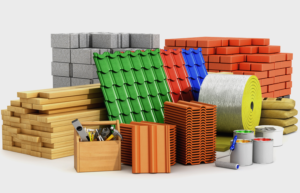
Demand for building materials slowed in 2024 after a significant increase last year due to low consumer solvency and insufficient funding for government recovery programs, the Association of Manufacturers of Building Materials noted.
“In general, in terms of estimated volumes, the first half of 2024 almost correlates with the figures for 2023, meaning that there was no miracle in the increase in demand. Sales of specific products today directly depend on the activity of small private developers. Large and truly solvent public or private consumers of wholesale volumes exist in single copies,” Konstantin Saliy, President of the All-Ukrainian Union of Building Materials Manufacturers, told Interfax-Ukraine.
According to him, individuals make up the bulk of real sales of building materials for which payment has been completed. At the same time, the programs “5-7-9”, “eHouse” and “eRecovery” stimulate unstable increases in demand, which allow keeping the sales of materials at the level of 27-50% of pre-war 2021, the expert noted.
“Under such conditions, the market climate is not expected to improve until the end of 2024,” added Saliy.
Meanwhile, the demand for aerated concrete is driven mainly by apartment construction, which is supported by recovery programs, said Oleg Syrotin, director of the All-Ukrainian Association of Autoclaved Aerated Concrete Producers.
“Today, the demand for aerated concrete has decreased by almost 60% compared to the pre-war period. The main consumer of our products, individuals, are hardly building any houses. The industry is surviving mainly due to multi-apartment construction, in particular through government programs for restoration and compensation to the affected people,” he said.
According to the expert, the growth in demand would be positively affected by the expansion of the eHouse state program to low-rise projects of small developers, as this sector was the main consumer of aerated concrete before the war.
“Aerated concrete is used in new construction, so the state program eHouse is the most effective for us. The second most effective program is eRestoration for severely damaged facilities where new walls need to be built. The impact of these programs is certainly positive, but we would like to see more financial resources from the state and banks for them,” explained Syrotin.
According to Ukrcement, cement consumption in January-June 2024 increased to 3 million tons, up 21.3% year-on-year. At the same time, the association’s forecast for the rest of the year is restrained.
“The biggest problem for cement producers is demand. Demand for products has fallen sharply, which means that revenues have also fallen, while costs, on the contrary, are rising. The forecast for cement consumption in 2024 is quite restrained. We had a significant jump in 2023. We produced 7.4 million tons of cement. This year we had a difficult summer in terms of electricity. Therefore, if we reach 8 million tons this year, it will be a very good result,” explained Lyudmyla Krypka, Executive Director of Ukrcement Association.
Demand is significantly affected by the situation at the frontline, as well as government support for the industry, the expert noted. According to her, the policy of subsidies and additional benefits from the state is important to ensure the stable development of the market.
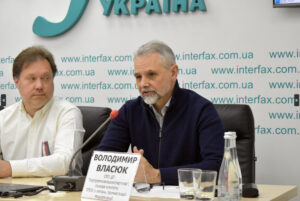
The share of imported construction materials in the Ukrainian market increased from 14% in 2021 to 23% in 2023, and the domestic construction materials market needs systematic support from the state.
This opinion was expressed by Volodymyr Vlasiuk, CEO of Ukrpromvneshexpertiza, Chairman of the CCIU Committee on Industrial Modernization, during the round table “Building Materials. Preparedness for Market Needs for Recovery” held at the Interfax-Ukraine news agency on Tuesday.
“The share of imports in covering domestic consumption has increased from 14% in 202 to 23% in 2023. Thus, even the funds that go through the public procurement procedure can be largely used for imports. More research is needed on individual materials, but the upward trend in the use of imported materials in a developed industry is generally negative for the economy,” Vlasiuk said.
He said that the second study of the construction materials market and its ability to meet the country’s needs since the beginning of the war is currently underway.
“The situation is changing dynamically. But there are still no glass production plants, as before. There are several (investment) projects, but they are not yet operational. As for such commodities as PVC, production has resumed and capacities have increased. New capacities are being built in the cement industry. But electrical equipment is still not available, as it was before the war. This is still a field for investment projects that should be stimulated by the state,” Vlasiuk said.
The expert highlighted key issues that businesses will not be able to solve without government involvement.
“In terms of stimulating demand, the role of the state is huge, as it increases procurement (for defense and recovery projects). It is extremely important that these funds are not spent on imported materials. We understand the extraordinary conditions in which Ukraine exists, we are at war. Therefore, in accordance with international law, we can apply, for example, Article 21 of the WTO, which allows a country to temporarily suspend its obligations assumed when joining the WTO,” Vlasiuk said.
He emphasized the need to focus on localization, purchasing materials (for budgetary or donor funds) only if at least some of them are produced in Ukraine.
The issue of booking specialists is also important. “It is necessary to find a balance between the needs of the economy and the frontline. Both areas are necessary for the country’s sustainability,” he said.
Another key task is to provide autonomous energy supply. “Obviously, it is necessary to move to a model of autonomous energy supply, for example, from alternative sources, primarily solar power plants. The state, together with partners, should offer good, cost-effective tools, as this requires a significant amount of funds,” Vlasiuk said.
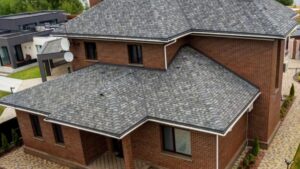
In 2023, the main areas of sales of Sweetondale products will be retail sales and low-rise housing construction, the company’s press service told Interfax-Ukraine.
The building materials manufacturer Sweetondale owns three plants in Ukraine that produce roofing and thermal insulation materials: a mineral insulation plant in Cherkasy, a polymer insulation plant, and a bitumen-polymer roll materials plant in Kamianske.
“Since the beginning of the full-scale invasion, we have seen a significant redistribution in sales channels. Previously, our main focus was on industrial and civil construction, but now retail sales (42%) and sales to low-rise cottage construction projects (47%) have come to the fore. The share of the professional segment has almost halved and now does not exceed 10%, but we hope that with the active launch of recovery programs and the emergence of new projects, this share will grow,” said Iryna Konotoptseva, Head of Marketing at Sweetondale.
According to the company’s analysts, just like before the war, Sweetondale holds leading positions in each of its production areas. Namely, mineral insulation accounts for approximately 47% of the market, polymer insulation for approximately 46%, and bitumen roll materials for approximately 55%.
Since the beginning of the full-scale invasion, the cost of polymer insulation and bitumen rolls, which have an imported raw material component of more than 80%, has increased significantly, by 40-45%.
“The main factors for this were the rising cost of raw materials, energy, fuel and the increased logistics leverage for the delivery of raw materials,” Konopoptseva explained.
“At the same time, the price of mineral insulation decreased by about 10%. This was achieved by partially using domestic raw materials.
“One of the main issues for us in recent years has been finding new suppliers of raw materials, and we have accepted this challenge. Currently, we supply the majority of raw materials for our products from Europe,” Konotoptseva said.
Logistics within the country has also risen significantly. Sweetondale delivers building materials throughout Ukraine, and the cost of transportation companies’ services has increased significantly. Konoptseva said that since the beginning of the war, the tariff for delivery from Kamianske to Kyiv and Uzhhorod has increased by 43%, and from Kamianske to Odesa by 54%.
The expert noted the high demand for manufactured goods from Ukrainians.
“Ukrainians continue to prefer domestic producers. In addition to the obvious support of the Ukrainian manufacturer, this is also a big benefit for customers, as traditionally European manufacturers are more expensive, and the logistics of these goods are longer and more expensive. Thus, according to our estimates, the share of Ukrainian producers in mineral insulation is 80%, in polymer insulation – 88%, and in rolled materials – 90%,” she said.
As for government programs (restoration, energy efficiency, etc.), their impact on the market is still insignificant.
“There are quite a few programs, but, in our opinion, they are still unstructured and the conditions for participation in them are not always transparent for business. In addition, we can note that such programs often use products with low characteristics,” Konotoptseva said.
According to Opendatabot, the authorized capital of Zavod “Sweetondale” LTD (Zavod “Sweetondale” LTD, EDRPOU code 32944149) is UAH 13.5 million, in 2022 the company received revenue of UAH 940.074 million, net profit amounted to UAH 112.112 million.
Sweetondale was founded in 2012 by Gary Alan Stern. Initially, it specialized in engineering and leasing of industrial equipment. Negotiations on the acquisition of plants owned by Russia’s Technonikol began in 2015 and ended in February 2018.
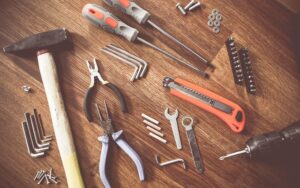
The portal “Diya” launched the possibility to connect to the program “eRestoration” general contractors and retailers of building materials, the Ministry of Development of Communities, Territories and Infrastructure informed.
“Starting from today, the business that sells construction materials and provides housing repair services can join the program of state aid “eRestoration”,” the ministry said on Facebook on Monday.
Thus, general contractors of residential and commercial construction (vendor code – 1520), stores of building materials and lumber (5211) and stores of glass, paint, wallpaper (5231) can become participants in the program.
According to the Department of Digital Transformation, more than 15,900 applications for assistance have been entered into the eRecovery system so far.
As it was reported, on May 10 there was launched the program of the state aid “eRestoration”, which provides assistance for current repairs of housing damaged as a result of war. The money can be used to purchase building materials, pay for construction work, as well as for the services of contractors who have the appropriate codes for work, and their vendors have applied for participation in the program through the portal “Dia”.
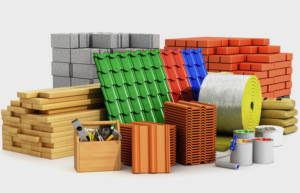
Almost 15 percent of Ukrainian producers of building materials suffered as a result of Russia’s aggression, but the sector is capable of providing up to 90 percent of the materials needed to rebuild the country, the USAID press service said.
These are the results of a study conducted by specialists from the public organization Institute for International Economic Research and the state enterprise Ukrpromvneshekspertiza with the assistance of the USAID Economic Support for Ukraine Project (USAID Project).
As reported, in 2022 the USAID project supported a study of the Kyiv School of Economics to assess the extent and cost of damage to infrastructure and residential buildings in Ukraine. According to data as of November 2022, destroyed facilities needed construction materials and equipment worth about $62.8 billion.
“Experts from Ukrpromvneshekspertiza and the Institute for International Economic Research studied the state of production capacity of Ukrainian construction material factories during wartime. They learned that about 15% of these plants were damaged or destroyed, but this sector retains high production capacity for a wide range of building materials and can provide up to 90% of the materials needed,” said USAID Deputy Project Director Brian Milakowski.
In addition, local production of building materials would save about 100,000 jobs, generate $5.6 billion in wages and $4.4 billion in tax revenue.
The results of the study show that the production of sheet glass or electrical switchboard equipment has been virtually eliminated. These materials are imported from EU countries, which affects their cost. At the same time, the construction of factories, including the production of glass, aerated concrete, dry construction mixtures, continues.
Among the problems named in the study were power outages due to damaged energy facilities, difficulties in accessing finance for working capital and capital investment. Some manufacturers pointed to accounts receivable from builders and the potential loss of key engineering personnel due to conscription into the Armed Forces.
For investment activities, the main barriers are recognized high military risks, the inability to obtain loans, the lack of understanding of the market in the long term, the high cost of connecting to the power grid. At the same time, investment activities continue. This concerns the construction of new facilities for the production of glass, gas concrete, dry mixes, cement, mineral wool.
“Ukraine and its partners can be confident in the ability of the domestic construction materials sector to meet most of the needs of the country’s post-war reconstruction. Donors and lenders to Ukraine can focus on this domestic production potential when planning their assistance,” Volodymyr Vlasyuk, director of Ukrpromvneshexpertiza SE, was quoted in the release.
The survey results also highlight opportunities for technical assistance and improved access to financing to overcome specific limitations for further recovery and growth of the sector. For the international community, the construction materials sector can be viewed as a priority for investment and assistance to the war-torn economy.
The USAID Ukraine Economic Support Project (USAID Project) was created to strengthen Ukraine’s economy affected by the Russian invasion.
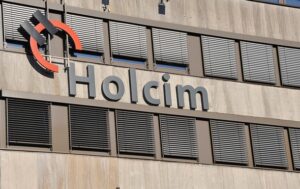
Swiss construction materials manufacturer Holcim is buying US roofing systems supplier Duro-Last for $1.293 billion.
According to a Holcim press release, the acquisition of Duro-Last will complement and strengthen the Swiss company’s operations in the roofing materials industry. The expected synergistic effect of the deal is $60 million per year.
The purchase of Duro-Last will bring Holcim’s roofing business annual sales above the $4 billion mark faster than previously expected.
Duro-Last is the market leader in commercial roofing systems in the U.S., with annual sales of about $540 million, Holcim noted.
The deal requires U.S. regulatory approval, and the parties plan to close by the second quarter of 2023.